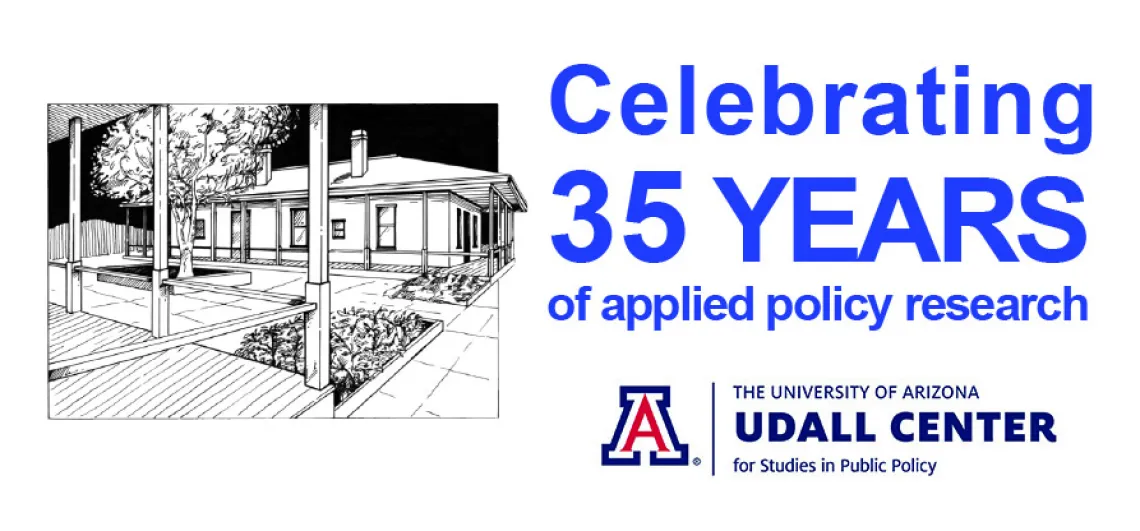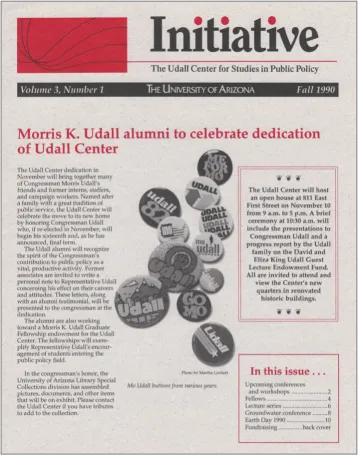Marking the 35th Anniversary of the Udall Center

This month marks the 35th anniversary of the Udall Center.
In March 1987, the Arizona Board of Regents approved the charter of the Udall Center for Studies in Public Policy. The idea for the Center emerged quite organically from a group of several dozen University of Arizona faculty with strong interests in public policy. The original Organizing Committee comprised 20 scholars across 20 different departments and 9 colleges.
In recalling these early days, Dr. Helen Ingram notes, “I was proud to become the founding director of the Udall Center based on my expertise in public policy, specifically in the then-emerging areas of water and natural resources policy. From the very start, we were mindful of our obligation to serve as a campus nexus of policy research. We began by organizing topical faculty seminars and lunches and integrating policy scholars from across campus within our own research projects. In that vein, one of my earliest and most enduring initiatives was the establishment of the Udall Center Fellows Program, which has provided for research leaves for University of Arizona faculty. That program, the only one of its kind on campus, is now in its 32nd year.”
The Udall Center began operation in mid-1988 and by 1989, it received its first of 11 grants from the Ford Foundation to fund research on transboundary water governance in the twin cities of Nogales in the US-Mexico border region. “Those grants, followed by awards from the Charles Stewart Mott Foundation, set us on a course of community-oriented, public-input-attentive environmental policy research,” recalled Robert Varady, who has been with the Center ever since that first Ford grant. “They literally put the Udall Center on the U.S.-Mexico border map.” That early effort in Nogales led to the Center’s enduring program on environmental policy – a program that has featured stakeholder involvement, information sharing, institution building, science-policy dialogues, transboundary management issues, and such contemporary concerns such as water security, the water-energy-food nexus, green infrastructure, technology, and global groundwater governance.
In 2001, the Native Nations Institute (NNI) was approved by the Arizona Board of Regents as a think-tank and research initiative to understand the governance challenges facing Indigenous nations in North America and beyond and to produce work that those nations could use as they pursued self-government and self-determined development. The Director of the Udall Center at this time, Dr. Stephen Cornell brought with him some of the ongoing research of the Harvard Project on American Indian Economic Development. “The timing was propitious: Indigenous nations in several parts of the world were vigorously pursuing self-governing power. It was exciting to be able to study that pursuit, see what we could learn from it, and find ways to make our research useful to the nations involved,” recalled Cornell.
Today, the Udall Center is a leading public policy center focused on environmental and Indigenous policy that works directly with communities, Indigenous nations, and institutions to provide research-based evaluations and policy options globally. Efforts around environmental policy and Indigenous governance continue to grow and evolve. Joan Timeche, NNI Executive Director, shared “For more than 20+ years, NNI has engaged with Native nations, communities, and citizens across the country providing policy analysis and research-based educational services that strengthen their governance to meet a myriad of challenges and opportunities. Our work continues to expand in the areas of data sovereignty, analysis of codes that are critical to Native nations, governing systems and role clarification, and education and engagement tools for both Native Peoples as well as those who work with them.”
As the newly-appointed director of the Udall Center for Studies in Public Policy, Dr. Andrea K. Gerlak hopes to usher in a new era of increased collaboration and engagement with stakeholders, keeping a central focus on environmental justice and equity by engaging especially with groups who have historically been underserved or underrepresented, such as low-income or minority communities, “The Udall Center has a long and rich history of commitment to Indigenous and sustainability issues that reflect the values of the larger university. It is such an important time to be working with communities on these issues,” says Dr. Gerlak.

Since 1990, the Udall Center has been located at the corner of Euclid Avenue and First Avenue, in a pair of iconic, historically-renovated territorial-style buildings built by Louise Foucar Marshall, the University of Arizona’s first female faculty member. The November 1990 dedication of the Center’s then-new home (see image) was attended by Congressman Morris K. Udall, who was in the late stages of Parkinson’s disease. It proved to be his last public event.
The Udall brothers’ careers in public service were permanently commemorated in 1992 when the U.S. Congress established the Morris K. Udall and Stewart L. Udall Foundation, a Tucson-based federal agency that continues to support the Udall Center.
The Udall Center, along with the Udall Foundation, will be honoring Mo Udall’s legacy with a pair of events, the first event will be held in Tucson, AZ, on April 28th, at the Environment & Natural Resources (ENR2) building on the UArizona campus. The second event will be at the UArizona’s Washington, D.C., Center for Outreach and Collaboration. The April program features a roster of distinguished speakers and panelists, along with Udall family members. Registration for the event is required.

